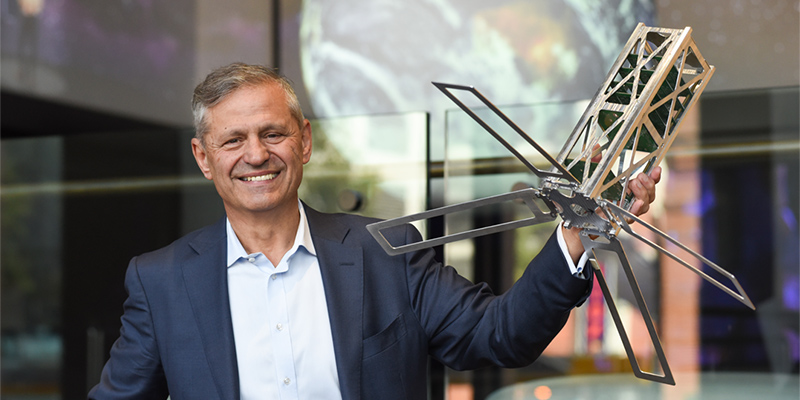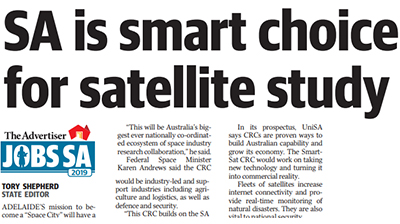UniSA to lead Australia’s multi-billion smart satellite revolution
By Michèle Nardelli
 TECHNOLOGY AND ENGINEERING Bid Leader and SmartSat CEO designate, UniSA’s Professor Andy Koronios, says the CRC will be a game changer for Australia’s space economy. Photo by Catherine Leo
TECHNOLOGY AND ENGINEERING Bid Leader and SmartSat CEO designate, UniSA’s Professor Andy Koronios, says the CRC will be a game changer for Australia’s space economy. Photo by Catherine Leo> What others are saying about the SmartSat CRC
UniSA will be the lead institution for one of the most significant space industry research concentrations in Australia when it heads up a new Cooperative Research Centre for Smart Satellite Technologies and Analytics – The SmartSat CRC.
 The Advertiser, 15 April 2019.
The Advertiser, 15 April 2019.The new CRC is a national research powerhouse involving a $190 million investment in cash and in-kind from 84 research and industry partners.
With $55m funding from the Federal Government through the Department of Industry, Science & Technology’s successful CRC program, the SmartSat CRC will be the biggest investment in space industry R&D in Australia’s history. It will play a key role in meeting the Australian Space Agency’s goal to triple the size of Australia’s domestic space industry to $12 billion, generating an extra 20,000 jobs by 2030.
The bid was developed by UniSA in partnership with Nova Systems.
Bid Leader and SmartSat CEO designate, UniSA’s Professor Andy Koronios, says the CRC will be a game changer for Australia’s space economy.
“Globally space technologies and industries are worth more than $500 billion but that success has been underpinned by serious global investment in research,” Prof Koronios says.
“Australia has had a strong pedigree and a long history in space with excellent scientific capabilities in instrumentation and communications technologies but until now, the research has not been brought together to build a new industry for Australia, and to capitalise on the exponential growth of the global space economy.
“Our goal in bringing together the bid for SmartSat, was to show the huge potential and capacity there is in Australia to make an impact globally by developing leapfrogging technologies in areas where we have some of the best expertise on the planet – AI, advanced communications and remote sensing analytics.
“For a nation with a footprint covering nearly one-tenth of the planet, Australia has had very little presence in space; we cannot rely exclusively on the goodwill of other nations or our deep pockets to meet our communications and connectivity needs or to monitor our nation and our resources.
“For example, through their advanced remote sensing capabilities with satellites passing over Australia every day, other nations have the ability to predict our crop yields before we can.
“As we advance at a pace to an era of machine-to-machine communications and the Internet of Things satellites are becoming central.”
Prof Koronios says that although the new CRC will be headquartered in South Australia it is a national program and will involve some of the best universities in the country as well as the CSIRO and DST.
It will establish state nodes to ensure that the whole of the nation is involved in the development of smart satellite technologies which will meet Australia’s needs to secure its defence, telecommunications and monitoring technologies into the future.
“This new CRC will re-energise Australia’s satellite communications expertise and capacity and launch a new era of development which will benefit every Australian enterprise into the future – improving communications for all Australians, helping us to monitor and protect our environment, enhance our understanding of climate change, protect our borders and our communications systems and advance the progress of new industries,” he says.
UniSA Vice Chancellor Professor David Lloyd says the ambition of the project proves Australian universities have a vital role to play in developing the partnerships that will be game changers in the Australian economy and in advancing the success and quality of life of all Australians.
“This is one of the most exciting research collaborations ever forged in Australia and we look forward to working with an outstanding international cohort to develop smart satellite and communications solutions for the future,” Prof Lloyd says.
“We are delighted to have such strong support from both government and industry in forging a really powerful network for space technology innovation.”
Partners in the CRC include global companies such as AIRBUS, BAE, MDA, Northrop Grumman, Saab, SciSys, Dassault Systems, and THALES; Australian companies - Nova Systems, OPTUS, SHOAL, and FrontierSI; Australian startups - including X-Lab, Myriota, Fluorosat, Fleet, Innovor, Lyrebird, Delta-V and x-lab; Australian universities and research organisations – ANU, UNSW, RMIT, Swinburne, QUT, Curtin, CSIRO, DST, the Universities of Queensland, Adelaide, Western Australia and Western Sydney; and international collaborators, UCL, Catapult, NASA, the European Space Agency and the National University of Singapore among many more.
A full list of the CRC partners is available online.
What others are saying about the SmartSat CRC
“SmartSat CRC represents Australia’s best opportunity for innovation-based growth in space.” – Peter Nikoloff, Co-Founder and Director, Nova Group and Director of the Board of the Space Industry association of Australia.
“I’m thrilled that the SmartSat CRC has been funded because it brings together all the players required to allow Australia to play a leading role in the development of a global space industry. Defence, through DST Group, is a proud partner in the SmartSat CRC.” – Chief Defence Scientist, Professor Tanya Monro
“I commend the government on this important investment for Australia at a time when we are moving to reposition ourselves as leaders in space science. Curtin University, and more broadly Western Australia is keen to play an important role given our geolocation and our expertise in space sciences. We look forward to contributing to the national effort and to leveraging investments in radio and optical astronomy through the Square Kilometre Array Project, Pawsey Supercomputing Centre and Dessert Fireball Network and partnerships with key industry leaders such as Cisco and Optus.” – Professor Chris Moran, Deputy Vice Chancellor Curtin University
“I’m delighted to see such strong investment in Australia’s growing space industry. I look forward to working together with the SmartSat CRC to enable major wins for Australia in laser communications, infrared sensing, earth observing and space law – all flagship programs for ANU InSpace.” – Professor Anna Moore Director of the ANU Institute for Space (InSpace)
"Australian start-ups will need structure and support to get past the 'valley of death', between doing good research and producing good products. The quicker we can bridge that gap the more competitive we will be and now is the time to start our manufacturing sector. I look forward to supporting the SmartSat CRC to reach its potential.” – Dr Jason Held, Chief Executive Officer, Saber Astronautics
“FrontierSI is excited at the opportunity to be a part of the emerging space industry that the SmartSatCRC will help create and support. We will apply our expertise, working alongside the SmartSatCRC, to ensure the research is looked at through the widest lens, creating further demand for Earth observation data and analytics across agriculture, mining, logistics and environmental management of natural disasters, such as fire and floods. This will make the work of the CRC and the importance of space research real, connecting technology to users and importantly maximising our use of space for the benefit of the Australian people and economy.” – Graeme Kernich, FrontierSI CEO
"The announcement of the CRC funding will assist start-ups in South Australia and around the country to enable future growth and further development. First, the Australian Space Agency announcement and now with this further funding on its way – it really is a major step forward for the future of the Australian space industry." – Flavia Tata Nardini, FleetSpace CEO
“As a startup that was originally spun out of UniSA, we are thrilled that the University has continued its strong commercialisation focus through leading the bid to secure this new, exciting space-focused research centre. We anticipate that the SmartSat CRC will support the next generation of space related startups to emerge by fostering relationships and industry connections. Securing the $200 million space industry-focused cooperative research centre is a significant milestone not only for UniSA, but for the Australian space industry. It comes only months after the announcement that the Australian Space Agency will be headquartered in Adelaide and is another big win for the development of Australia’s space industry.” – Myriota CEO and Co-founder, Dr Alex Grant
Other Stories
- UniSA to lead Australia’s multi-billion smart satellite revolution
- Howzat! UniSA bowls over cricketers with new fatigue tracker
- Lights, camera … action! Teaching true crime online
- UniSA research independently assessed as having significant impact
- From the Vice Chancellor
- Achievements and Announcements
- World first 3D printed feet: steps up treatment for diabetics
- Finding dignity and grace in the aftermath of the Christchurch attack
- Can you describe UniSA in one word?
- Students create interactive artwork for Asian design festival
- $1.2m renewable energy project a win for consumers and industry
- Space tourism – a launch Australia can’t afford to miss
- The latest books from UniSA researchers
- In Pictures



